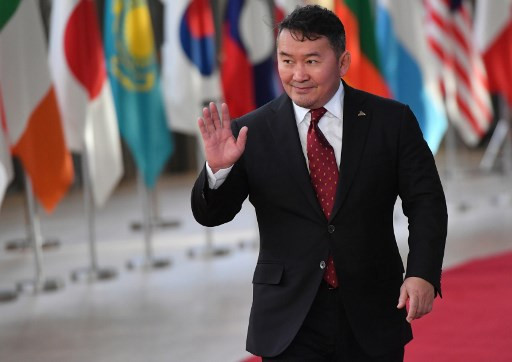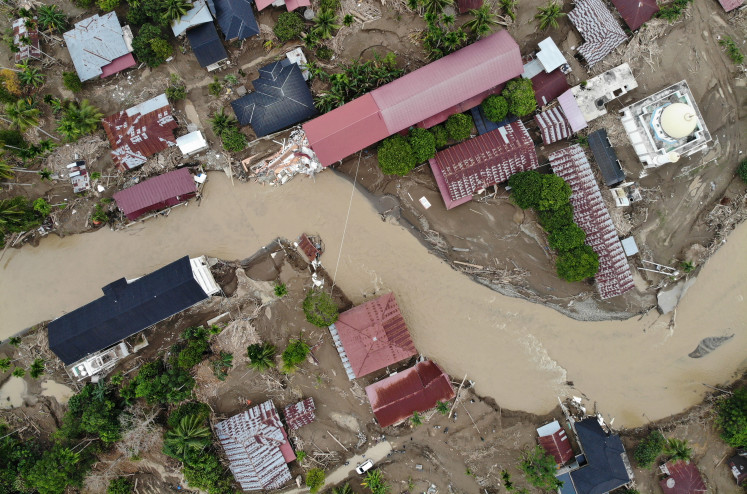Popular Reads
Top Results
Can't find what you're looking for?
View all search resultsPopular Reads
Top Results
Can't find what you're looking for?
View all search resultsA significant test for multilateral diplomacy
Change text size
Gift Premium Articles
to Anyone
T
he Asia-Europe dialogue, which is officially known as Asia Europe Meeting (ASEM), is the diplomatic result of a valuable joint initiative of France, Germany and Singapore.
The fundamental objective of ASEM is to develop relations between Europe and Asia at large. ASEM started in Bangkok with 25 members in 1996, and now has 53 partners: 30 European countries, 21 Asian countries and two international organizations (the European Union and ASEAN).
Australia and New Zealand are active members of this forum.
By its nature, ASEM is an intergovernmental process of informal dialogue in which an exchange of views can take place on all topics of common interest to member countries.
ASEM's activity revolves around three "pillars": political, economic and financial, socio-cultural. This last pillar covers issues relating to education, health, employment, the environment, science and technology, culture, as well as relations between civil societies.
As a forum for multilateralism, ASEM is expected to become a real driving force for the future, consolidating its role as a dynamic facilitator in key areas of interregional cooperation.
Europe and Asia have an important role to play in strengthening the institutions of global governance, including through ASEM. Their co-responsibility in the management of global crises must be clearly recognized. In this regard, ASEM could bring an important contribution to the process of transforming the new multipolar balance of power into effective and successful multilateralism.
Former Finnish President Martti Ahtisaari, who received the Nobel Peace Prize, said: "At present, Asia-Europe cooperation is no longer a luxury but a necessity. Expanded cooperation between the two continents is vital in order to contribute to global peace and security. Cooperation is essentially rooted in constructive dialogue. ASEM occupies a unique position in facilitating such a dialogue between Europe and Asia ".
There are many comments about ASEM as a "messy diplomatic dance", and opinions according to which Asian nations are "traditionally more accustomed to bilateralism, not multilateralism, and prefer to attend ASEM with their own respective positions." This description of the situation is not correct.
The European Union and ASEAN share similar global visions and develop multilateral cooperation to resolve common cross-border issues. To advance this position, the two regional organizations should demonstrate their diplomatic maturity by making vigorous efforts to revitalize ASEM.
The 53 current partners of ASEM, in a ministerial statement of Sept. 7, 2020 – almost ignored by the mainstream media – reaffirmed their commitment to maintain the momentum of ASEM to strengthen multilateralism and mobilize in solidarity in the fight against COVID-19. They expressed hope that ASEM would emerge from this unprecedented global challenge stronger and more resilient. ASEAN and the EU will have a responsible role in implementing this legitimate expectation in this complex and multidimensional process.
The ASEM I Summit in Bangkok on March 1-2, 1996, among other things, underlined in its final declaration the need to improve cooperation between the two regions in the public health sector. During the same Summit, ASEM I also agreed to cooperate to promote effective reform and greater democratization of the United Nations system, including in matters concerning the UN General Assembly.
These commitments are still on the waiting list. ASEM 13, which will be hosted by Cambodia in 2021, will have the difficult task of advancing action-oriented measures to give tangibility to all collective commitments on global health, as well as to the UN substantive recommendations on fight against COVID-19.
At this juncture, ASEM must avoid becoming a club that is long on speech and short on substance. To this end, the European long experience in many fields and Asian traditional adaptability to change could be better combined.
To that end, the ASEM partnership should be revitalized to become more visible, more proactive and less reactive in addressing regional and global issues, including while dealing with prevention and response to pandemics. In this regard, the EU presidency and the ASEAN chairmanship play a very important role in promoting the credibility of ASEM through persuasive action.
In all circumstances, a true inter-regional partnership requires innovative diplomatic efforts to develop balanced relations based on reciprocity.
On Oct. 29, 2020, under agenda item 128 of the UN General Assembly, a draft resolution presented by the president of the UNGA, Volkan Bozkir, entitled Special Session of the General Assembly in response to the coronavirus pandemic (COVID-19) was circulated around the world.
After informal diplomatic consultations and a brief procedural debate, the draft was adopted on Nov. 5, 2020, and all ASEM member countries voted in favor of the resolution.
A majority of UN member states have already approved the request, made on behalf of member states of the Non-Aligned Movement, to convene a special session of the UNGA in response to the COVID-19 pandemic, at the level of heads of state and government.
The entire operative part of the resolution is devoted to the organizational aspects of the proposed extraordinary session, which will be held on Dec. 3-4 at the UN Headquarters in New York.
It can be expected that at the UNGA special session, ASEM members will help find realistic global solutions in the process of combating COVID-19 for the benefit of all humanity.
Therefore, this diplomatic event can be considered as a promising and testing turning point in the context of global efforts to win the war against the COVID-19 pandemic. Its positive results, demonstrating the diplomatic maturity of the world organization and its members, could prove to be an important prerequisite for achieving real progress in the ongoing fight against COVID-19.
ASEM 13 scheduled in 2021 should bring diplomatic satisfaction to its 53 participants by offering win-win solutions acceptable to all. There is no doubt that it is not an easy task.
The 2021 ASEM Summit hosted by Cambodia will also be called upon to help find a clearer organizational identity for ASEM. The promotion of mutually beneficial multilateral cooperation between Asian and European nations, with greater intensity, is an imperative prerequisite for successful diplomacy, in harmony with ASEM's lofty vision itself.
Complacency is the enemy of successful interregional diplomacy, which requires creativity and genuine strategic thinking to face the myriad of current global challenges, including those unprecedented by their nature which have appeared in the present war against the COVID-19 pandemic which must be won.
The writer is a visiting professor at Assumption University in Bangkok. The original article was published by On Line Opinion, Australia’s e-journal of social and political debate.










